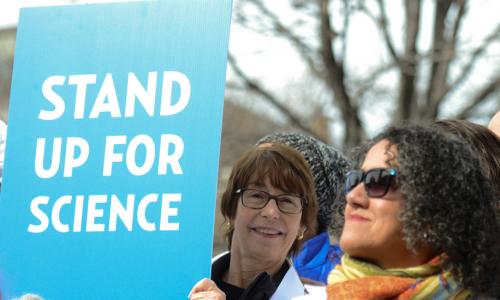Fossil fuel companies and their lobbying groups have been deceiving the public for nearly 30 years about the facts of global warming. They continue to do so today.
1988: A landmark year for climate science
The science is clear. The burning of fossil fuels is a major contributor to global warming, a fact long established in the scientific community. Scientists have known for decades—and were convinced by the late 1970s--that disruptive climate change would likely occur.
In 1988, several landmark events highlighted the growing risks of global warming, elevating the issue to broad public awareness.
James Hansen, a leading climate scientist and director of the NASA Institute for Space Studies, testified before Congress that scientific data confirmed humans’ role in climate change. That same year, the Intergovernmental Panel on Climate Change (IPCC) was created. And Congress introduced the National Energy Policy Act of 1988 in an effort to reduce the generation of heat-trapping gases.
Since then, a growing body of scientific research has unequivocally established the fact that human activity is driving up the planet’s temperature and causing substantial—and growing—impacts to our communities, our health, and our climate.
How did fossil fuel companies respond?
As the scientific evidence became clear, internal documents show that some of the world’s largest carbon producers—including Chevron, BP, Shell, ExxonMobil, Peabody Energy, and ConocoPhillips—worked for years to deceive the public about the reality of global warming.
These companies have known for decades that their products—coal, oil, and natural gas—cause harm, yet even today they continue to fund front groups and trade associations who seek to sow confusion about climate science and block policies designed to reduce the heat-trapping emissions that cause global warming.
Meanwhile, more than half of all industrial carbon emissions have occurred since 1988 and the world remains on a trajectory for substantial and dangerous global warming.
Fossil fuel companies should be held accountable
Governments, individuals, and industry all bear some responsibility for global warming. But fossil fuel companies are substantial contributors to the problem, and therefore must take responsibility for their actions.
There are several steps fossil fuel companies should take. An essential first action is for fossil fuel companies to stop disseminating climate disinformation, either directly or through trade associations and other industry groups. This should include severing ties with organizations like the American Legislative Exchange Council.
Fossil fuels companies should also fully disclose the financial and physical risks of climate change, invest in low-carbon and renewable energy resources, support policies to shift away from fossil fuels, publicly disclose their direct and indirect political spending, and pay for their share of the costs of climate-related damages and climate preparedness.
Sources and methodology
Click on each quote in the infographic above for source information and additional background materials. You can also select the quote from the list below:
"The cause of this trend and whether it is abnormal remain in dispute." --ExxonMobil, 2005
Learn more about global warming science and the methodology and sources behind the infographic.
Rights and permissions
You are free to use and post this infographic without alterations online, in written materials, and in presentations. Any online use must include proper citation and a link to this web page.



